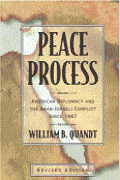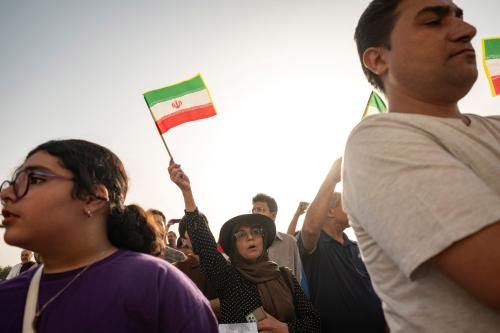 Of all the dramatic consequences of the 1967 War, the dual impact on the Palestinians stands out most: The Arab defeat bolstered the rise of Palestinian nationalism even as it inevitably led to the gradual decline of Arab support for the Palestinians. Fifty years later, the impact cannot be missed.
Of all the dramatic consequences of the 1967 War, the dual impact on the Palestinians stands out most: The Arab defeat bolstered the rise of Palestinian nationalism even as it inevitably led to the gradual decline of Arab support for the Palestinians. Fifty years later, the impact cannot be missed.
What the war set in motion
Of the many extraordinary results of the war—the decline of Arab nationalism, the bolstering of U.S.-Israeli strategic relations, the expansion of Soviet influence, and the broader hit that collective Arab identity took (as has been recorded in much Arab literature ever since)—the path the war set for the Palestinians was hardest for them to overcome.
For one thing, the seizure of the Gaza Strip and the West Bank (including East Jerusalem) meant that all of historic Palestine (Israel, the West Bank, and the Gaza Strip) had come under Israeli control. The occupation of the West Bank and Gaza Strip still haunts Palestinians and defies diplomatic solutions. But one reason for the Palestinian predicament is a strategic transformation in Arab priorities: Principally, Arab states became focused not only on the occupation of Palestinian lands but also of lands belonging to Israel’s two most powerful neighbors, Egypt, which lost the Sinai, until it was returned to it following the Egyptian-Israeli peace treaty of 1979, and Syria, which lost the Golan Heights.
It is fair to say that the first 20 years of the conflict between Israel and the Arabs were framed with reference to Palestine—not so much as an embodiment of a Palestinian nation, but as part of the lands Arabs believed belonged to them. This was the logic of the Arab states that fought the 1948 war. And this was the logic of Arab nationalism, particularly as championed by Egypt’s charismatic pan-Arab leader, Gamal Abdel Nasser. Palestine was not advocated as a separate nation as much as being the heart of a bigger Arab nation. Palestinians, weak and dispersed, heard Nasser’s promises as music to their ears and became the biggest advocates of Arab nationalism. Israel stood in the way not only of Palestinian dreams but also of Arab dreams.
Palestinians and the Arab world
The shocking defeat of Arab forces by Israel led to three outcomes that had particularly strong impacts on the Palestinian issue. The first is a creeping Arab sense that Israel wasn’t about to disappear. The second is that, in occupying Syrian and Egyptian sovereign territories, Israel acquired direct levers with those states, possessing assets that they wanted back even more than helping Palestinians. The third is that Palestinians, disillusioned by Arab governments after Israel occupied the West Bank and Gaza, decided to take things into their own hands.
The occupation of Egypt’s Sinai laid the road toward Egyptian-Israeli Peace at Camp David a decade later, aided by the 1973 war which improved Egypt’s negotiating hand but failed to recover the Sinai for Egypt or the Golan Heights for Syria. With Egypt taken out of the military equation, the Arab states’ ability to fight effective conventional wars against Israel was dramatically reduced. Syria held out longer, but ultimately was prepared to enter bilateral talks with Israel, though these failed in 1999. The Palestinians continued to get Arab funding and rhetorical backing, but their leverage was dramatically reduced.
Immediately after the war, the Palestine Liberation Organization broke free from control of the Arab states (it was originally formed under Egyptian auspices in 1964). Within seven years, in 1974, the Arab summit conference in Rabat, Morocco declared the PLO the “sole legitimate representative of the Palestinian people” embracing the notion of Palestinian nationhood. It was a moral and political victory for the Palestinians, but came at a cost: If Palestinians were now on their own, Arab states also had license to go it alone. Even Jordan, which had claimed the West Bank and saw itself as speaking for the Palestinians, eventually made its peace with Israel in 1994, without Israeli withdrawal from the territories.
Ever since 1967, every time Palestinians felt sidetracked by events, they took matters into their own hands. In 1987, they unleashed the first Intifada after the Iraq-Iran war marginalized their issue; and in 1993—after the collapse of the Soviet Union and frustrations with the Madrid negotiating process—Palestinians made their own interim deal with Israel in Oslo as Arab support declined after the 1991 Iraq war.
Staying power
Despite Arab governments’ shifting priorities, Arab publics have not fully abandoned Palestine, which remains tied to the sense of being an Arab. Witness, for example, how in the two states that made peace with Israel—Egypt and Jordan—public opinion has been among the harshest on Israel, resulting in what has been termed a “cold peace.” But so much has happened in the past 15 years in particular—conflicts in Iraq, Syria, Yemen, Libya—that even Arab publics are deeply distracted by their own immediate tragedies and struggles.
The consequence has been startling: When Arabs proposed the regional Arab Peace initiative in 2002, it was conceived as bringing leverage to help strengthen the Palestinians’ hand in negotiating with Israel. Today, the regional approach that President Trump advocates is embraced by Israel’s government, which feels Arab rulers badly need Israeli and American support and that they would pressure or marginalize the Palestinians instead.
But the strength of the Palestinian sense of nationhood that has grown in the past half-century cannot be ignored. Palestinians are not going away. And with all its growing relative power, Israel has no ability to impose a sustainable unilateral solution without their say.
Rather than being temporary, the occupation has lasted lifetimes.
The 50th anniversary of the 1967 War brings things into focus: For Palestinians, the term “occupation” has been a double-edged sword. On the one hand, it signals a state of affairs that must come to an end, that the occupied territories are not Israel’s, that there are limits to what Israel can do under international law; on the other hand, it leads to international complacency with a state of affairs that’s morally intolerable, a terribly unequal relationship that’s unjust for the occupied. International acquiescence is in part driven by a sense that “occupation” is intended as a temporary state of affairs, subject to diplomatic efforts to bring about a more permanent outcome. Thus, peace-making diplomacy has always been used as a reason to call for patience, a sort of moral fig leaf to oppose occupation while tolerating it. The 50th anniversary of occupation blows the fig leaf away: Most Palestinians in the occupied territories have been born—and many born and died—under conditions of occupation. Rather than being temporary, the occupation has lasted lifetimes.
This calls for moral urgency: Regardless of what outcome remains possible (two states, a creeping reality of one-state, or some other outcome), the peaceful pursuit of that outcome must not be allowed to divert attention from what has been for many Palestinians a lifetime of humiliation. Immediate focus must be on transforming Palestinian lives and fulfilling their human rights—as if current conditions are semi-permanent. Because conditions have been this way for as long as most Palestinians can remember. After 50 years, and despite multiple diplomatic efforts, the safest bet in predicting the conditions 10 years from now is to guess that the current status quo will likely continue, give or take—with more suffering and loss of life along the way. Can we morally live with that?
The Brookings Institution is committed to quality, independence, and impact.
We are supported by a diverse array of funders. In line with our values and policies, each Brookings publication represents the sole views of its author(s).










Commentary
The dual effects of the 1967 War on Palestinians reverberate 50 years later
May 31, 2017